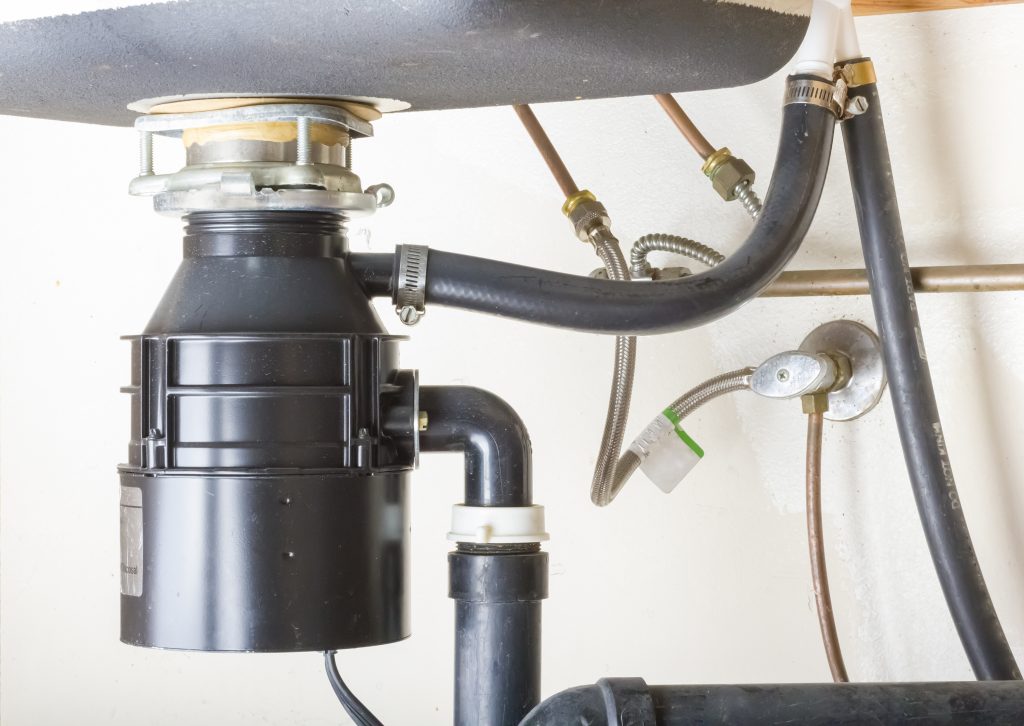
Garbage disposals are one of the most sought-after kitchen appliances in today’s market. They make dealing with dinner plate residue and vegetable trimmings rather easy. But here is the problem, many folks think the sink is the black hole for kitchen scraps. That is not the case. Follow these tips on maintenance to keep your unit running smoothly with minimal repairs.
Once A Week Maintenance
Fill your drain with a handful of ice cubes and a cup of rock salt. Run the unit for a minute or two. This will remove any residue lining the inside of your disposal. Next, pour a cup of vinegar into the drain and a half cup of baking soda. Things will get fizzy but this will kill bacteria. Finally, let it set in the disposal hopper with the unit turned off for a few minutes. Run the unit for another minute or two.
Once a Month Maintenance
Fill your drain with a handful of ice cubes. Run the unit for a minute or two. This will help sharpen your blades and clear away waste. Cut up pieces of citrus fruit like lemons, limes, or oranges. Turn on the cold water and run the unit for a minute or two. This will help reduce bad smells as well help with bacterial growth.
1. Do run the garbage disposal every few days with cold water to keep the blades from rusting from lack of use.
2. Use all natural cleaners for your system. Try using baking soda, vinegar, lemons, oranges, and limes.
3. Break up large objects before grinding them. Give your appliance a helping hand and cut scraps into small pieces.
4. Use caution if you accidentally drop something down your disposal. Unplug the unit.
5. After each use, pour a small amount of dish soap down your drain with cold running water. Next, use dishwashing detergents that de-greases your dishes. Grease is the glue that holds bacteria together in pipes.
1. Don’t put fibrous foods down the drain. Artichokes, asparagus, banana skins, broccoli, and celery are not permitted down the drain. Also, corn husks, onion skins, potato peelings, and rhubarb are not allowed either. They can twist around the blades of your disposal and halt your motor.
2. Eggshells, coffee grounds, noodles, rice, oats, and other starchy foods clog your pipes. These are no good for your system and can gum up the works.
3. Bones and seafood shells do not belong in your disposal but in the trash. They can break your appliance.
4. Next, never use your fingers to pull out any clogs. Using pliers or tongs to remove any scraps that are not ground up is a better idea once you unplug the unit.
5. Don’t use bleach or any commercial drain cleaner to unclog or disinfect your unit. Drain cleaners can damage your appliance. And bleach can harden grease in your drain lines. The liquids can also splash up into your eyes which is never good.
6. If your unit becomes clogged don’t pour hot water down the drain. Heat melts fats which can make the unclogging process more difficult.
7. Avoid any grease, fat, oils, down your drain. Instead throw the greasy stuff out with the trash or in a sealed jar.
8. Do not put any objects made of glass, plastic, and metal down the drain.
9. Finally, never toss your unused medications down the garbage disposal. Because it can impact the water supply. The FDA recommends giving them to a take back medicine location. Some meds can be flushed but there it has to be on a flush list. If not of the flush list they can be tossed in the trash with dirt or kitty litter.